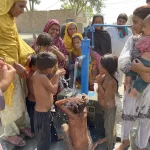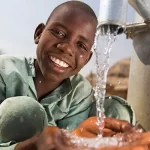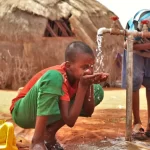Faq
- #hopemakers #cleanwaterforall #wellofhopes
Vision
Water is a blessing from Allah (swt) that we often take for granted, but during Ramadan, through the mercy of Allah, we become more conscious of the difficulties faced by those without access to safe water. Giving water is a highly recommended action in Islam, and its rewards are multiplied even further during this blessed month. Here are seven reasons why you should spend your Sadaqah and Zakat on water – before Ramadan is over!
It brings you closer to Allah
With 842,000 people dying from diarrhea alone each year, unsafe water is the single biggest obstacle to the health of communities in the developing world. Small children are especially vulnerable to cholera and diarrheal illnesses, and unsafe water compromises their immune systems as well, making it difficult for them to fight any illness.
The gift of water saves lives, which is a hugely rewardable action. Allah says in the Qur’an, ‘And whoever saves one [a life] – it is as if he had saved all of mankind’. (Qur’an, 5:32) Imagine this – every single time the clean water you donated saves someone’s life, it is as if you have saved all of mankind!
It is ‘the best charity’
‘The Messenger of Allah (saw) was asked, “Which charity is best?” He replied, “Providing water”’. [Abu Dawud]
We use water for everything, from washing dishes to cooking food to growing crops. Allah says in the Qur’an, ‘By means of water, we give life to everything’. (Qur’an, 21:30) Communities who don’t have access to clean water face unimaginable hardships, with women and children walking for hours to collect even a little water, and families unable to support themselves due to lack of education and livelihood. Having access to safe water is a basic human right and fulfilling this right is an excellent Sadaqah.
Give how much you can – Allah will reward you
Not all of us are able to build wells for entire communities – but don’t worry, that doesn’t mean you have to miss out on the rewards! Reward is based on the sincerity of our intention, and even giving a single glass of water carries immense rewards if it’s all you can give.
Allah’s Messenger said, ‘A prostitute was forgiven by Allah, because, passing by a panting dog near a well and seeing that the dog was about to die of thirst, she took off her shoe, and tying it with her head-cover she drew out some water for it. So, Allah forgave her because of that’. [Bukhari]
This hadith shows that even giving water to an animal is immensely beneficial. When you build a well, it not only benefits a deprived community, it also benefits their livestock, and every time anyone drinks from that well, Allah may forgive your sins.
You can build a well in someone else’s name
On the authority of Sa‘d bin ‘Ubadah he said, ‘O Messenger of Allah! Umm (mother of) Sa‘d has died, so which charity is best?’ He replied, ‘Providing water’. He said, ‘So Sa’d dug a well and said, “This well is for Umm Sa‘d”’. [Abu Dawud]
Ramadan is a time when we remember our loved ones who have passed away, and many of us want to give Sadaqah Jariyah in their name during this blessed month. In the above hadith, the Prophet (saw) recommended water as the best charity to give in someone’s name. Every time someone breaks their fast using this water; every time someone wears clothes washed with that water; every time someone eats a vegetable grown from that water – both of you will be rewarded for that.
The gift of water can often bring communities back to life through the ultimate Sadaqah Jariyah chain reaction. Clean water leads to healthy livestock, healthy people, more children in school, more women in jobs, improved agriculture and sustainable livelihoods. By building a well in a deprived community, you will get the reward for every single one of these things, in sha Allah.
Zakat is the third pillar of Islam and denotes the amount of wealth a Muslim must pay to certain groups of underprivileged people.Zakat itself is neither a tax nor a charity but is a compulsory act of worship stipulated by Allah (swt). Zakat is intended to purify our wealth, not only physically, but also spiritually. It purifies our heart against selfishness as well as ensuring that society’s poorest are protected against hunger and destitution.
Muslims past the age of puberty and are of sound mind are eligible to pay Zakat as long as they meet the required Nisab threshold.In order to be eligible to pay Zakat, your level of excess wealth must remain higher than the Nisab value for a full year. This is when your Zakat payment will be due.
Your Zakat payment is a compulsory act of worship which includes Zakat on Gold.Therefore, you need to pay 2.5% of the value on the Gold you own.
The Nisab – the minimum value of wealth one must possess for Zakat to become payable – is defined as:
87.48g of gold
612.36g silver
You can base your Nisab on either the gold or silver amount. This is usually the equivalent value in your local currency. Most scholars favor the lower value (silver at present) as it means that more people can pay Zakat and therefore more people can benefit.
Zakat is due a year after your level of personal wealth has reached the Nisab threshold. In order to remain eligible to pay Zakat, your level of excess wealth should remain higher than the Nisab for a full lunar year. For example, if your level of expendable wealth exceeds the total Nisab value in the month of Ramadan, your payment will not be due until the following Ramadan, so long as your personal wealth remains above the threshold. If at any time your wealth drops below the level of Nisab, you would cease being eligible to give Zakat. Once your wealth increases to the Nisab level, you would begin counting 12 lunar months from that point onwards.
The value of Zakat is 2.5% of your personal excess wealth. This means that if your excess wealth comes to a value of $1,000, your Zakat payment would be $25.
Zakat is due on:
- Gold and silver, including ornaments or jewelry containing gold and/or silver
- Cash held at home or in bank accounts
- Stocks and shares owned either directly or through investment funds
- Money lent to others
- Business stock in trade and merchandise
- Agricultural produce
- Livestock animals such as cows, goats and sheep
- Pensions
- Property owned for investment purposes
The categories of people/causes entitled to receive Zakat are described in the Qur’an, 9:60, as:
The Poor: Those receiving little or no income.
The Needy: Someone who is struggling to meet their basic needs.
Administrators of Zakat: Those who are responsible for collecting, storing, guarding, registering and distributing Zakat.
Those Whose Hearts are to Be Reconciled:Those who are new to Islam.
Those in Bondage: Freeing those who are enslaved/ held captive.
Those in Debt: As long as the debts were not incurred through acts against Islamic law.
In the Way of Allah: Promoting Islamic values.
The Wayfarer: Anyone who is stranded whilst traveling or away from home and needs financial assistance – as long as they traveled for lawful purposes.
If you have not paid Zakat from previous years in which you were eligible to do so, you must pay what you owe as soon as possible. Missed Zakat would be calculated in the same way you calculate your current Zakat – however, you would use the Nisab value from the missed Zakat year, as opposed to the current Nisab value.
Zakat is one of the Five Pillars of Islam and is an obligatory annual payment made to purify all wealth held above the Nisab threshold value. Sadaqah is not at all obligatory; it is simply a kind gesture made with the intention of helping others.
- Each drop creates the sea
A concrete help for a better and kind world
1
Donation Info
Quisque eu euismod arcu. Morbi et dapibus diam, sed interdum velit. Proin tempor nunc vel nisl condimentum.
- In sit amet augue non dui
- Proin quis elit lacinia arcu
2
How we work
Quisque eu euismod arcu. Morbi et dapibus diam, sed interdum velit. Proin tempor nunc vel nisl condimentum.
- In sit amet augue non dui
- Proin quis elit lacinia arcu
3
Possibility of help
Quisque eu euismod arcu. Morbi et dapibus diam, sed interdum velit. Proin tempor nunc vel nisl condimentum.
- In sit amet augue non dui
- Proin quis elit lacinia arcu
4
How we help
Quisque eu euismod arcu. Morbi et dapibus diam, sed interdum velit. Proin tempor nunc vel nisl condimentum.
- In sit amet augue non dui
- Proin quis elit lacinia arcu
- A help to those who need it
Each donation is essential to us
Sed tristique ac lorem quis maximus. Aliquam pharetra, dui vel finibus porta, elit massa vestibulum sapien, eu molestie odio lacus a odio. In ornare felis vitae lacus congue pretium. Donec ligula arcu, ultrices nec vulputate a, lacinia sed lectus. Donec vel eros hendrerit, iaculis arcu vel, euismod ligula.
Lorem ipsum dolor sit amet, consectetur adipiscing elit. Donec malesuada risus id orci sodales, ut cursus dui scelerisque.
Lorem ipsum dolor sit amet, consectetur adipiscing elit. Donec malesuada risus id orci sodales, ut cursus dui scelerisque.
Lorem ipsum dolor sit amet, consectetur adipiscing elit. Donec malesuada risus id orci sodales, ut cursus dui scelerisque.
Lorem ipsum dolor sit amet, consectetur adipiscing elit. Donec malesuada risus id orci sodales, ut cursus dui scelerisque.
- Stay informed
Check all our News
Lorem ipsum dolor sit amet, consectetur adipiscing elit. Nunc orci nisl, tempus ut sem a, scelerisque
Projects
2021 Ramadan
The “It's My Project” or IMP scheme was launched in 2003 by Muslim Hands. It allows you as a donor to fund and carry out your very own charitable project...
READ MOREPast
2022 Ramadan
The Annual Project Feedback Report presents an outline of the activities undertaken in 2022 as part of the Community Water Well Program, which received support from Muslim Hands Canada in collaboration with #Well of Hope. This report delves into the program's influence, providing insights into its implementation, achievements, and future aspirations.
READ MOREPast
2023 Ramadan
The Annual Project Feedback Report offers insights into the activities of the Community Water Well Program in 2023, backed by Muslim Hands Canada representing #Well of Hope. This report sheds light on the program’s influence, outlining its execution, results, and forthcoming goals.
READ MOREUpcoming
2024 Ramadan
Lorem Ipsum is simply dummy text of the printing and typesetting industry. Lorem Ipsum has been the industry's standard dummy text ever since the 1500s...
READ MOREWrite us for more information on donations
Quick Links
- Well of Hopes - Copyright 2024

















